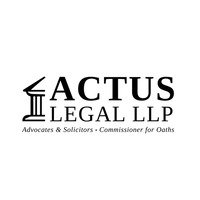Best Office Solutions Lawyers in Chinatown
Share your needs with us, get contacted by law firms.
Free. Takes 2 min.
List of the best lawyers in Chinatown, Singapore
About Office Solutions Law in Chinatown, Singapore
Office Solutions Law in Chinatown, Singapore mainly involves addressing legal issues related to commercial property, business leasing or rental, contract laws, dispute resolutions, and intellectual property rights. Many business owners, freelancers, or entrepreneurs operating in office spaces in Chinatown often face specific legal issues related to contracts, office space renting/leasing, renovating, subletting, licensing, compliance with building codes and fire safety regulations.
Why You May Need a Lawyer
Lawyers are needed when navigating business leases, as the language can often be complex and may contain terms and conditions that are not in your favor. If you are planning on modifying an office space, you will need to understand local building regulations. Disputes over rental or leasing agreements, involving property damages, late rent, or eviction, often necessitate legal representation to effectively resolve the issue. In case of subletting, a lawyer will ensure your adherence to your own lease contract and local laws. Lastly, issues related to intellectual property including trademarks, copyrights and patents also require legal expertise.
Local Laws Overview
Chinatown, Singapore has specific zoning and land use regulations that affect office spaces. The Building Control Authority regulates office renovations to ensure compliance with safety and accessibility standards. There are specific local fire safety regulations that business premises must comply with such as the Fire Safety Act. In terms of contracts, the Singapore Contract Law regulates all agreements. For rental or lease disputes, the Rental Law is applicable. Also, Intellectual Property Law protects the rights of innovators and creators in a business setting.
Frequently Asked Questions
What is a commercial lease?
A commercial lease is a contract between a landlord and a business outlining terms and conditions of property rental. It's more complex than a residential lease and requires understanding of business needs.
What is subletting?
Subletting is leasing out a part or whole of the rented property to a third party for a period of the lease. It's often subject to the consent of the landlord and may be regulated by specific clauses in your lease agreement.
What are local zoning laws?
Zoning laws divide cities into zones (residential, commercial, industrial) dictating how properties in certain areas can and cannot be used.
What should I consider before modifying an office space?
Before modifying an office space, consider local building regulations, fire safety norms, your lease agreement terms, and get any necessary permissions or licenses.
What if I have a rental disagreement with my landlord?
In case of rental disagreements, it's suggested to initially try resolving it directly. If it's not possible, having legal counsel may be necessary. Legal action should be the last resort.
Additional Resources
The following organizations can be good resources: The Singapore Land Authority (SLA), Intellectual Property Office of Singapore (IPOS), Building and Construction Authority (BCA), and the Singapore Civil Defence Force for fire safety regulations.
Next Steps
If any legal issues arise related to Office Solutions in Chinatown, it is best to consult with a lawyer who has expertise in commercial property law. They can provide legal counsel, negotiate on your behalf, and represent you if a dispute escalates to litigation.
Lawzana helps you find the best lawyers and law firms in Chinatown through a curated and pre-screened list of qualified legal professionals. Our platform offers rankings and detailed profiles of attorneys and law firms, allowing you to compare based on practice areas, including Office Solutions, experience, and client feedback.
Each profile includes a description of the firm's areas of practice, client reviews, team members and partners, year of establishment, spoken languages, office locations, contact information, social media presence, and any published articles or resources. Most firms on our platform speak English and are experienced in both local and international legal matters.
Get a quote from top-rated law firms in Chinatown, Singapore — quickly, securely, and without unnecessary hassle.
Disclaimer:
The information provided on this page is for general informational purposes only and does not constitute legal advice. While we strive to ensure the accuracy and relevance of the content, legal information may change over time, and interpretations of the law can vary. You should always consult with a qualified legal professional for advice specific to your situation.
We disclaim all liability for actions taken or not taken based on the content of this page. If you believe any information is incorrect or outdated, please contact us, and we will review and update it where appropriate.








